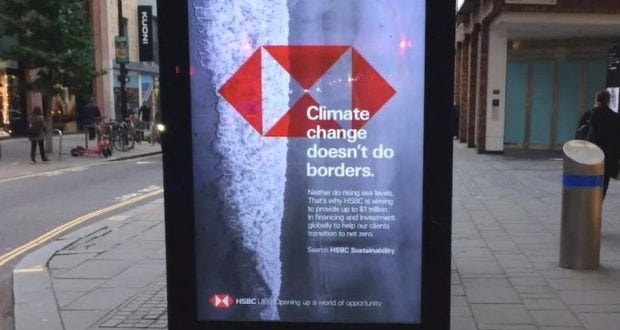The Last Tree
A collection of climate stories
The Last Tree in Rochina, Brazil! by Luis Bhering
No need to explain this arresting image.
Brands behaving badly
Mums the word British Airways
I’m not sure I can use the term BA these days, the familiar shorthand for many years, a great British brand, revered nearly as much as our other great acronym, the BBC. These days, it’s just another airline and not a very good one.
A couple of weeks ago, I wrote about sustainable aviation fuel (SAF) and wee Willie Walsh’s answer to maintaining profits with less carbon attached.
Since writing that piece, openDemocracy, a good source for justice, revealed BA’s owner, IAG, have been pressurising the British government to drop any insistence that emissions data be made available on transatlantic routes.
This came about because of the Department for Transport’s (DfT), 2021 consultation on its Jet Zero strategy.
When booking a flight in future, customers would be given access to environmental information, raising awareness of the carbon emissions associated with that seat. It would help customers looking for the lowest emission option, where there is no obvious alternative apart from flying.
The DfT became interested because of a 2018 study by the International Council on Clean Transportation (ICCT). Their independent research found significant differences in emissions per passenger on transatlantic routes.
It revealed that the worst performing airline was BA burning 63% more fuel per passenger kilometre than the best, Norwegian. Even if you ignore Norwegian, who have new planes and no longer fly transatlantic, BA were 22% worse than the industry average.
Their poor performance is because their fleet is older, less fuel-efficient, and they carry a higher proportion of premium seating, resulting in more emissions per bum.
US airlines also objected to more transparency, but others, including easyJet and Ryanair, who don’t fly transatlantic, supported the proposal. I’m assuming they want it adopted on their European routes?
Greenwashing HSBC forced to stop
Thanks to moreaboutadvertising.com for the picture
The Advertising Standards Authority (ASA) has banned an HSBC poster campaign first seen a year ago, at bus stops in London and Bristol. They stipulated that any future forays in the direction of responsible green investing, must be accompanied with an account of their own carbon contributions thus far to the climate crisis.
I recently closed my First Direct account because of their parent company, HSBC’s investment behaviour.
Until relatively recently, closing a bank account was to be avoided at all costs. It was only the truly dedicated or aggrieved who were prepared to put up with the disruption and significant extra work and inconvenience of switching banks.
It is now so easy and simple. My lovely new online bank, which of course encourages such reckless behaviour, took care of everything. I was given a date for completion, (about a week) they communicated by email a couple of times and my old bank said they were sorry to see me go. They didn’t ask why.
HSBC is still coming to terms with having to deal with the inconvenience of having to include all its high carbon investments not just the 65.3m tonnes of carbon dioxide from their oil and gas customers every year. It hopes to have it all sorted by 2050. Give them a nudge.
Green discovery
Solid state battery research at NASA
Courtesy of NASA
To keep a heavy object flying safely in the air, one thought might be to choose something a bit more powerful than a battery to do the heavy lifting. To have the remotest chance, it would have to store large amounts of energy, while remaining as light as possible.
There is also another headache. If we imaging that our super battery is a bucket. It’s not just how much charge the bucket can hold, it’s also how fast it can be emptied. It needs to be super quick.
NASA have a group of clever bods working on this conundrum, in a department called the Solid-state Architecture Batteries for Enhanced Rechargeability and Safety, SABERS for short.
They’ve been experimenting with new materials not normally associated with batteries and have made huge progress with the power discharge problem. It’s also led to additional design changes, which is why the architecture has moved to solid-state, removing the need for a liquid electrolyte. Unlike current lithium-ion technology, where each cell requires its own case, these new batteries can be stacked vertically together inside a much bigger shell. This has led to a 30-40% weight reduction and increased capacity by as much as 300%.
They’ve already demonstrated the ability to power objects at 500 watt-hours per kilogram, double the requirements of an electric car.
Another bonus for the electric aircraft of the future; solid-state batteries don’t catch fire when they malfunction and continue to operate when damaged.
Be happy
Free the seed - open source salvation
Some of us may have heard of open source software. Good examples would be Mozilla Firefox (web browser) or Linux (operating system), where the code behind the application is freely shared with the world.
While neither may be owned by Microsoft or Apple, it still hasn’t stopped those two behemoths, controlling a significant proportion of popular software, which we pay for.
Something very similar happens with seeds. An Oxfam study in 2012, revealed that four companies dominate global trade in seeds and grains, Bayer (Monsanto), Corteva (DuPont), ChemChina and Limagrain.
Global companies and monopolies tend to focus on profit and polarise on cash crops like corn and soya, at least in the US. They are less interested in biodiversity, the small farmer or world hunger.
In 2012, Jack Kloppenburg, professor emeritus at Wisconsin-Madison university co-founded the Open Source Seed Initiative (OSSI), with six other, like-minded agricultural experts.
Their focus is the free flow and exchange of genetic resources for plant breeding and variety development. They want to encourage novel plant varieties to combat global warming, disease and climate changes. About 50 seed breeders have signed up with OSSI in the US.
In the UK, I found the Seed Cooperative. They believe the future of food is also rooted in diversity and democracy, which means room for more than 4 global corporates, and a determination to share ownership and knowledge. They look for seed varieties which are open pollinated and adapted for organic growing
Halloween
During my life, one event that has grown in significance is halloween. While knocking on doors for sweets did occur when I was a lad, trick-or-treeting, with houses dressed for the occasion, was a much bigger event for my children and remains so today.
This house is on my usual route with Pogo, our crocked old dog. What made me laugh, is the building to the left, partly in view, is a nunnery.





